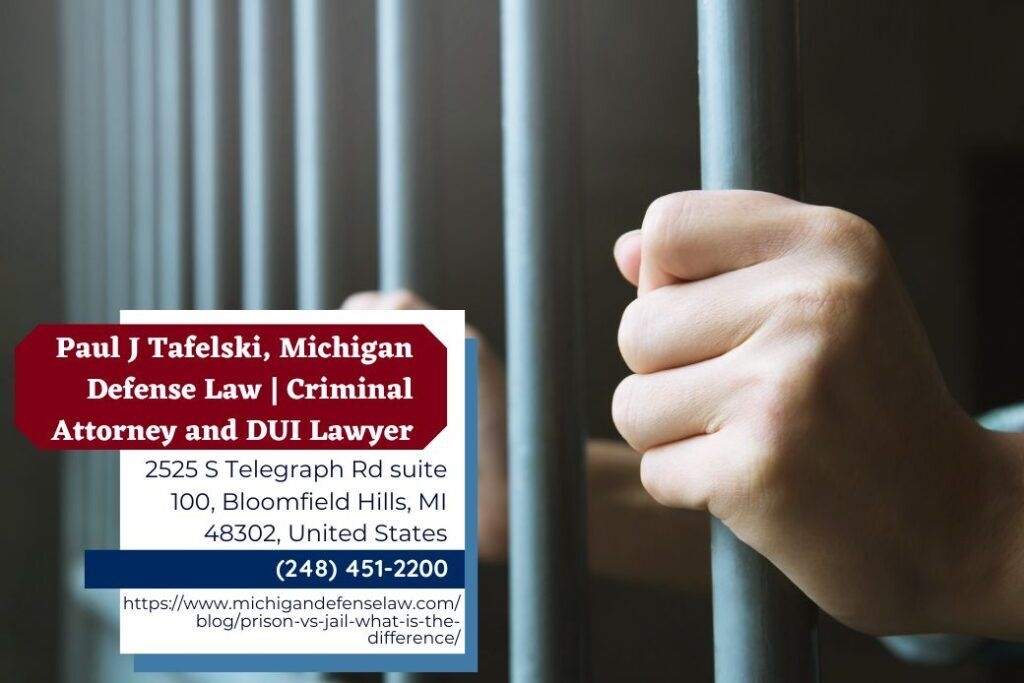Understanding the difference between prison and jail is a critical aspect of navigating the legal system, particularly for those facing criminal charges. In a recent article titled "Prison vs. Jail: What is the Difference?", Oakland County criminal defense lawyer Paul J. Tafelski (https://www.michigandefenselaw.com/blog/prison-vs-jail-what-is-the-difference/) offers insight into the roles these facilities play in the justice process. Representing Michigan Defense Law, Tafelski discusses the distinct purposes, management structures, and environments that define jails and prisons, providing clarity for those confronting incarceration in Oakland County.
Oakland County criminal defense lawyer Paul J. Tafelski points out that jails primarily function as short-term holding facilities. They house individuals who are awaiting trial or sentencing, or who are serving brief sentences, typically less than one year. These facilities are managed by local city or county authorities and act as the first point of contact for those entering the criminal justice system. The transient nature of jail populations shapes the environment, which tends to focus on security and the swift processing of individuals through the legal system.
In contrast, prisons are long-term facilities meant for individuals convicted of more serious crimes. Oakland County criminal defense lawyer Paul J. Tafelski explains that prisons, governed by state or federal agencies, serve those who have been sentenced to terms exceeding one year. These institutions provide not only secure confinement but also access to rehabilitation programs such as education, vocational training, and mental health services. According to Tafelski, “The strategy for your defense can depend heavily on whether you’re dealing with potential jail time or a prison sentence.”
Paul J. Tafelski underscores that understanding the difference between jail and prison can significantly impact legal defense strategies in Oakland County. The type of facility an individual may face affects many factors, including access to programs, the level of security, and the overall daily experience. Tafelski notes that Michigan’s criminal justice system employs a structured approach, with the Michigan Department of Corrections (MDOC) overseeing prisons and local sheriffs managing jails. This separation ensures that each facility type meets the specific needs of its population.
Jails, due to their short-term nature, have limited programming and frequently experience high turnover. Individuals in jail may face restrictive routines with limited recreation and fewer resources. Meals are basic, visitation is tightly controlled, and access to educational or work opportunities is minimal. In contrast, Michigan prisons offer more structured routines. Inmates may engage in work, attend classes, or receive counseling. These programs aim to support long-term rehabilitation and successful reintegration into society.
Tafelski also describes how Michigan classifies inmates based on security needs rather than just the crime committed. The MDOC uses a five-tiered custody level system, ranging from Level I to Level V, plus administrative segregation. This classification is regularly reviewed and may change based on an inmate’s behavior. Additionally, the state provides “Special Use Beds” for those needing medical attention, mental health care, or other specialized services. These considerations aim to balance the safety of facilities with the welfare and rehabilitation of inmates.
Another key point raised by Paul J. Tafelski is the importance of family visitation in both jails and prisons. He details the approval process required for visitation in Michigan’s correctional facilities, highlighting the procedural steps necessary for inmates to stay connected with family members. Clergy visits are also permitted under strict guidelines, adding another layer of support for incarcerated individuals.
From a legal defense standpoint, the distinction between jail and prison can influence not just sentencing outcomes but also how a defense is structured from the outset. Understanding the conditions, resources, and long-term implications of incarceration enables legal teams to better advocate for their clients. As Tafelski emphasizes throughout the article, preparing for the right scenario, whether jail or prison, can significantly alter the approach and effectiveness of a defense strategy.
For those facing legal proceedings in Oakland County, gaining insight into the differences between jail and prison is not merely informative, it can be a crucial part of achieving a fair outcome. The distinctions shape the nature of confinement, the programs available, and the long-term impact on a person’s life. Legal representation that takes these differences into account can offer a more tailored, realistic defense.
Michigan Defense Law, with Paul J. Tafelski leading the effort, continues to guide clients through these challenging circumstances with a clear understanding of the justice system. By focusing on the legal and practical aspects of incarceration, Tafelski helps individuals prepare for what lies ahead and work toward a better resolution.
Those seeking guidance on criminal charges in Oakland County can find clarity and direction through Michigan Defense Law. Legal outcomes can hinge on the difference between a jail stay and a prison sentence, and having the right defense approach can make all the difference.
About Michigan Defense Law:
Michigan Defense Law, led by attorney Paul J. Tafelski, represents individuals facing criminal charges throughout Oakland County and surrounding areas. The firm handles a range of cases, helping clients understand their rights and navigate the criminal justice system with informed legal strategies.
Embeds:
Youtube Video: https://www.youtube.com/watch?v=xFw3Esz6Rtc
GMB: https://www.google.com/maps?cid=7441820969606749572
Email and website
Email: paul@michigandefenselaw.com
Website: https://www.michigandefenselaw.com/
Media Contact
Company Name: Michigan Defense Law
Contact Person: Paul J. Tafelski
Email: Send Email
Phone: (248) 451-2200
Address:2525 S Telegraph Rd suite 100
City: Bloomfield Hills
State: Michigan 48302
Country: United States
Website: https://www.michigandefenselaw.com/






